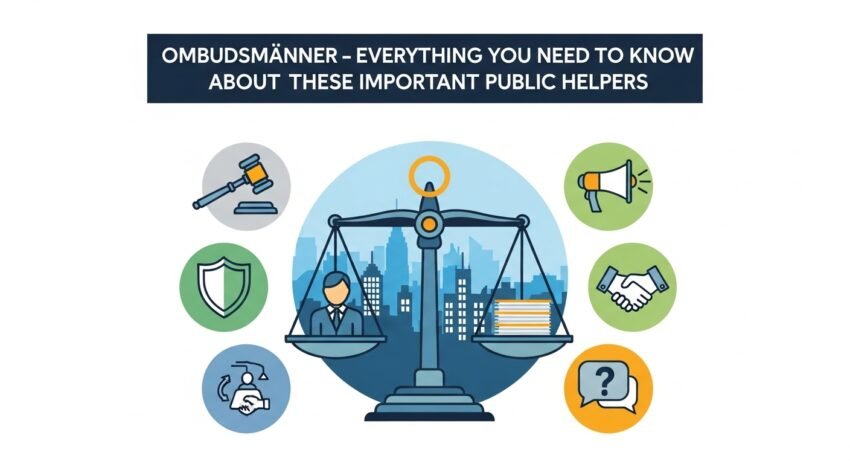Table of Contents
Introduction
Have you ever had a problem with a company, school, or public office and didn’t know who could help? That’s where ombudsmänner come in. An ombudsmann (plural: ombudsmänner) is a person you can go to when you feel like something is unfair or not working right. They listen to people, check facts, and try to solve problems in a fair way. If you’ve been treated badly or ignored, they can help make sure your voice is heard. Ombudsmänner aren’t new. They’ve been around in many countries for years, helping people handle small and big conflicts. Their job is to protect your rights by giving advice, mediating, or suggesting changes to avoid problems in the future. In this guide, we’ll make it easy to understand what ombudsmänner do, why they matter, and when you might need one.
What Does an Ombudsmann Do?
An ombudsmann is someone who helps people sort out complaints, especially when dealing with public services or large organizations. Their job isn’t to punish or pick sides. It’s to look into problems, gather information, and help people and organizations find fair solutions. Ombudsmänner can look into issues about schools, hospitals, workplaces, banks, and more. They often talk to both sides of a problem and suggest ideas that work for everyone. Ombudsmänner don’t take you to court and don’t cost money to use, so they are a friendly, fast way to solve issues. They might suggest rule changes or help make sure policies are fair for everyone. In many cases, just having someone neutral listen can stop a small issue from becoming a big conflict.
A Short History of Ombudsmänner
The word ombudsmann comes from Sweden, where the first official ombudsmann was created over 200 years ago. Sweden wanted someone who could hold the government responsible and protect people’s rights. Since then, many countries adopted their own ombudsmänner systems. Today, you’ll find these helpful roles in places like Germany, Austria, Canada, the UK, and more. While the name might sound different in each language, the main idea stays the same. Ombudsmänner help people find fairness. Over time, new types of ombudsmänner popped up too—like student ombudsmänner in universities or financial ombudsmänner for banking problems. Learning where the idea came from helps us see that asking for help isn’t a weakness—it’s actually part of a better system for everyone.
Where Can You Find Ombudsmänner?
You can find ombudsmänner in many different places. Every field has special ombudsmänner to handle their types of problems. In schools or universities, a student ombudsmann helps with things like unfair grades or bullying. In healthcare, a patient ombudsmann might help if you’re unhappy with how a hospital treated you. In businesses, workplace ombudsmänner support employees dealing with conflicts, harassment, or unfair job decisions. Some countries also have a national ombudsmann who can listen to problems about public services like police, housing, or government offices. You can usually find them online or in the HR or customer service department. These offices are made to help—they are not scary, and you don’t need to be an expert to reach out.
How Do You Contact an Ombudsmann?
Getting help from an ombudsmann is usually free and easy. First, figure out which type of issue you’re facing—school, work, hospital, government—and find the right ombudsmann for that. Many places list their contact information on their website or public posters. You can often send an email, fill out a complaint form, or call their office. Some ombudsmänner also offer in-person meetings. When you contact them, describe your problem clearly, include any important dates or documents, and explain how it has affected you. Don’t worry about using perfect words—they are there to help, not judge. After reviewing your case, they might talk to the other party, ask questions, or suggest ways to fix things. Reaching out to an ombudsmann is a brave and smart step toward solving problems peacefully.
When Should You Ask for an Ombudsmann’s Help?
You should think about going to an ombudsmann when you’ve tried solving a problem on your own but haven’t gotten a fair result. Maybe no one is listening. Maybe your complaint keeps being ignored. Or maybe you feel stressed because you don’t know who to talk to. That’s the right time for an ombudsmann. Don’t wait until things get worse. These helpful people are trained to spot issues and make things clearer. They save people time, money, and a lot of stress by giving friendly advice and helping both sides agree on fair solutions. People contact ombudsmänner for both small and serious issues. As long as your concern is real to you and involves a service or policy, it’s okay to ask for help.
Are Ombudsmänner Neutral?
Yes, ombudsmänner are expected to stay neutral and fair. That means they don’t take one person’s side just because they like them or work for them. Instead, they look at the facts, listen to different points of view, and keep things private. Their job is to protect fairness, not personal opinion. That’s why people trust them. When someone knows the ombudsmann is neutral, they feel more comfortable sharing their story. And when the other side knows they’re being treated fairly too, they’re more likely to listen and work things out. Neutrality is what makes ombudsmänner different from lawyers, bosses, or managers. It helps create trust and real change without fear or drama.
What Kind of Problems Can an Ombudsmann Help With?
Ombudsmänner can help with many everyday problems that feel hard to solve alone. For example, let’s say you’re a student who feels you were graded unfairly, or maybe your teacher isn’t helping when you report bullying. A student ombudsmann can step in, talk to both sides, and help find a fair solution. At work, if you’re facing discrimination or feel unsafe reporting harassment, a workplace ombudsmann can give confidential support and point you to safe action. Is your hospital bill wrong, and no one is fixing it? A healthcare ombudsmann can step up. Even renters who aren’t getting fair treatment from landlords sometimes get help from tenant ombudsmänner. The list is long, and while they can’t solve everything, they can guide you to the next right step.
How Confidential Is the Process?
One great thing about speaking with an ombudsmann is how private the process can be. Ombudsmänner must follow rules that protect people’s identities and concerns. That means they don’t share your name or details with others unless you agree. They won’t talk to your boss, teacher, or anyone else without your permission. This makes it easier for people to open up and tell the full story. Trust is key, and ombudsmänner take it seriously. In many cases, they also work behind the scenes to fix problems without making things too public. This helps avoid shame or blame and helps both sides focus on solutions instead of conflict.
Do Ombudsmänner Have Legal Power?
Ombudsmänner usually don’t have legal power like judges or police. They cannot make arrests, give fines, or force people to follow their advice. But their power is still real. Because they’re respected, trusted, and careful, people often listen to their suggestions. Their reports can lead to changes in toxic systems, unfair rules, or broken communication. Many companies or schools rely on ombudsmänner to keep peace and stay ethical. Even when they don’t have hard legal power, ombudsmänner have the power of knowledge, trust, and voice. And that kind of power can lead to real improvements—without going to court.
Why Ombudsmänner Help Improve Organizations

Another reason ombudsmänner are valuable is that they help organizations learn and get better. When people report complaints, ombudsmänner collect ideas and feedback by spotting patterns. For example, if lots of students complain about the same unfair grading policy, that’s a sign something needs to change. If workers report feeling unheard by a certain manager, that manager might need coaching. Without ombudsmänner, these problems stay hidden. But with them, leaders can take action to improve systems, build trust, and keep people safe. In this way, ombudsmänner are like mirrors—they show what’s really happening from different views, all to help things improve.
The Difference Between Ombudsmänner and Lawyers
You might wonder if seeing an ombudsmann is the same as hiring a lawyer. Not quite. Lawyers give legal advice, speak for you in court, and charge fees. Ombudsmänner don’t do any of that. They are independent, free to use, and focused more on solving problems peacefully than through legal fights. Lawyers use laws to argue sides. Ombudsmänner use conversation to build understanding. If your issue is more about being heard, fixing misunderstandings, or changing unfair behavior, an ombudsmann may be right for you. But if someone breaks the law or your case needs legal action, a lawyer could be the better choice. Sometimes, you might even use both. It depends on what you need.
FAQs
What is an ombudsmann?
An ombudsmann is a person who helps people sort out fair solutions to problems in schools, work, or public services.
Are ombudsmänner free to use?
Yes, most ombudsmänner are free and available to help without charging any fees.
Is my information safe with an ombudsmann?
Yes, they keep your information private and will not share anything without your permission.
Can an ombudsmann make people change their actions?
Not directly, but their advice is often followed because they are neutral and offer smart, fair solutions.
What kinds of issues do ombudsmänner handle?
They help with complaints related to school grading, bullying, workplace conflict, unfair bills, public services, and more.
Do all countries have ombudsmänner?
Many do! While names may differ in each country, similar roles exist in schools, hospitals, workplaces, and government offices.
Conclusion
Today, people face more complex systems and busier lives than ever. Sometimes problems pile up, and you don’t know where to begin. That’s where ombudsmänner come in. They help make confusion clear, turn frustration into progress, and bring calm to emotional situations. They stand up for fairness in a way that’s gentle, supportive, and real. Whether you’re dealing with a school issue, work conflict, or customer service nightmare, an ombudsmann can be your strongest quiet helper. They remind us all that asking for help is wise—not weak. And that good systems aren’t just about rules—they’re about people. So the next time something feels unfair, remember: reaching out to an ombudsmann might be the first step toward finding your voice and feeling heard.
